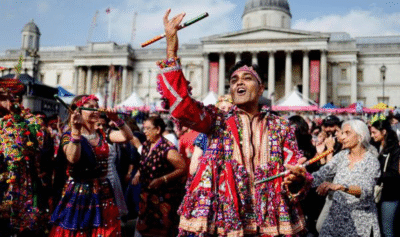The Indian diaspora is one of the most dynamic global communities, with the United Kingdom serving as a historic and strategic hub. This special research report by Pravasi Setu Foundation, prepared by Research Intern Vidhi Jakhmola, provides an in-depth analysis of the Indian diaspora in the UK—highlighting their socio-economic contributions, cultural influence, political participation, as well as the challenges they continue to face.
🔑 Key Insights from the Report
- Civic & Economic Contributions
- Over 1.4 million people of Indian origin live in the UK, forming 2.5% of the population.
- Indian pupils consistently outperform their peers in education, driving high employment in key professions such as law, healthcare, finance, and technology.
- The UK contributes 6.8% of India’s total remittances, making it the third-largest remittance source.
- Cultural & Social Influence
- Indian cultural organizations, faith groups, and events like the UK-India Year of Culture strengthen cultural diplomacy.
- Initiatives such as UKIERI (UK-India Education and Research Initiative) foster academic exchanges and collaboration.
- Political Engagement
- Indian-origin leaders now hold influential positions, including Prime Minister Rishi Sunak and former Home Secretary Suella Braverman.
- British Indians are increasingly considered “swing voters”, influencing the UK’s political landscape.
- Policy Frameworks
- UK-India 2030 Roadmap aims to double bilateral trade and enhance people-to-people ties.
- Young Professional Scheme (YPS) and International Education Strategy position Indians as central to UK’s talent and education system.
- Equality Act 2010 and Integrated Communities Action Plan 2019 shape diaspora integration and protection.
- Challenges & Vulnerabilities
- Despite success, the community faces identity struggles, racism, and a rise in religious hate crimes, particularly targeting Hindus.
- Policy gaps such as short-term visa frameworks hinder long-term integration.
- Recommendations & Strategic Pathways
- Shift UK immigration policies from transactional to permanent integration.
- Ensure equitable protection against anti-Hindu hate crimes.
- Strengthen diaspora security frameworks and invest in long-term community welfare.
📖 Conclusion
The Indian diaspora in the UK is not just a migrant community—it is a “living bridge” that strengthens cultural diplomacy, drives economic growth, and shapes political discourse. However, policy gaps, rising hate crimes, and identity struggles demand urgent attention. Addressing these issues will ensure that the diaspora continues to thrive as a resilient and influential pillar of Indo-UK relations.



Leave a Reply